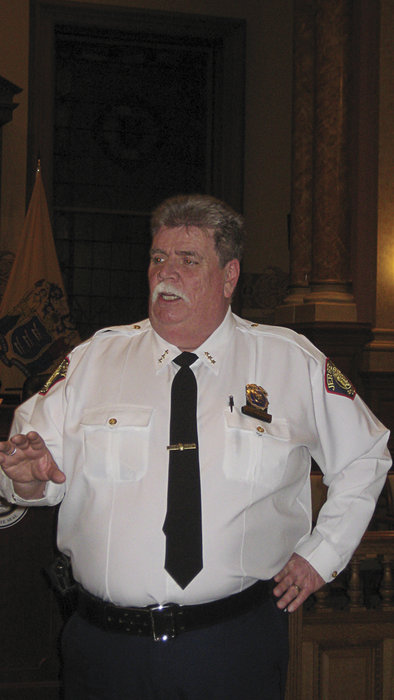Beginning July 1, the Jersey City Police Department (JCPD) will have to pick up the tab for the maintenance of its Closed Circuit Television Neighborhood Watch camera system, an $800,000 bill that was in the past covered by money from the state Urban Enterprise Zone (UEZ) Program.
The CCTV system is one of the first city programs to feel the pinch from the loss of UEZ funding from Trenton.
Jersey City’s CCTV program was launched in 2001 and today it includes dozens of closed circuit cameras that are spread throughout the city. Last week during the city’s fourth public meeting on crime and public safety, Police Chief Thomas Comey credited the CCTV system with deterring crime, gathering information for investigations, and locating suspects.
‘The Urban Enterprise Zone program [allowed] us to hire police officers to patrol in commercial areas and install effective CCTV crime cameras.’ – Jerramiah T. Healy
____________
He added that he is working with the city to find ways to fund the CCTV system, possibly with help from federal grants.
The 24-hour CCTV system is monitored by civilian employees of the JCPD who use the images caught on camera to assist in the department’s crime-fighting work. Used in conjunction by the JCPD, the Office of the Hudson County Prosecutor, and the state Attorney General, the system had for years been funded by the Jersey City Economic Development Corporation through the UEZ Assistance Fund. The UEZ fund supported the creation, maintenance, and management of the CCTV system.
Until the UEZ program was scaled back, the Jersey City Economic Development Corporation and the JCPD were expanding the system into additional commercial areas of the city and updating the equipment to better serve the citizens and businesses in Jersey City.
Phased out
Launched in 1983, the UEZ Program was started to stimulate the local economies of the state’s once-blighted urban areas. Businesses located in a designated Urban Enterprise Zone could charge a sales tax that is half of the usual state sales tax (currently 3.5 percent). A portion of this tax money was then returned to the city for local economic development, including capital improvements, and salaries for public safety workers. Through loans, grants, and other resources, Jersey City, like other enterprise zones, used its UEZ money to attract small businesses, help small businesses get started, assist businesses make improvements, and train residents for jobs.
Between June and November of last year, however, the administration of Gov. Christopher Christie began to close out the funding portion of the UEZ program. Christie and his allies in Trenton have maintained that some of these uses did not specifically meet the stated goals of the UEZ Program.
Since the 2008-2009 fiscal year, which ended on June 30, 2009, Jersey City has seen its UEZ funding drop from $15.1 million to $2.9 million, according to Cliff Adams, CFO of the Jersey City Economic Development Corporation. In fiscal year 2009-2010 the city received $7.4 million in UEZ funding. That same year the state held back about $13.1 million in anticipated UEZ funding to the city.
Mayor Jerramiah T. Healy last week said the loss of this funding has had a huge impact on the city.
“Not only did the Urban Enterprise Zone program allow us to hire police officers to patrol in commercial areas and install effective CCTV crime cameras, but we also were able to use the [money] for the Second Chance Program that hires ex-offenders,” Healy said last week. “The program allowed us to beautify the gateways to the city, give small store owners some assistance to improve their facades, and provide resources for local organizations, such as Rising Tide Capital, Women Rising, and other entities that teach job skills. We gave grants to small- and medium-size business to re-locate to Jersey City and were able to use the funds to market the advantages of doing business in Jersey City.
“All these efforts over the years have helped make Jersey City the nation’s 12th largest downtown market in regard to office space, attracting international businesses,” said Mayor Healy. “These corporations, and the satellite businesses that support them, have provided jobs for our residents and revenue to many small business owners. The loss of the UEZ program is devastating not only for Jersey City, but for all of the other urban municipalities in New Jersey that rely on this funding, which is being cut at the same time other state and federal aid is also being reduced.”
Healy said he is lobbying Gov. Christie and the state legislature to restore the UEZ money.
E-mail E. Assata Wright at awright@hudsonreporter.com.
